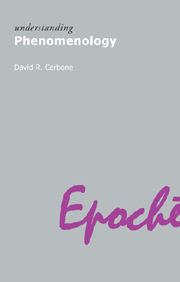Book contents
- Frontmatter
- Contents
- Acknowledgements
- Abbreviations
- Introduction: opening exercises
- 1 Husserl and the project of pure phenomenology
- 2 Heidegger and the existential turn
- 3 Sartre and subjectivity
- 4 Merleau-Ponty and the phenomenology of embodiment
- 5 Problems and prospects: phenomenology and its critics
- Questions for discussion and revision
- Further reading
- References
- Index
5 - Problems and prospects: phenomenology and its critics
- Frontmatter
- Contents
- Acknowledgements
- Abbreviations
- Introduction: opening exercises
- 1 Husserl and the project of pure phenomenology
- 2 Heidegger and the existential turn
- 3 Sartre and subjectivity
- 4 Merleau-Ponty and the phenomenology of embodiment
- 5 Problems and prospects: phenomenology and its critics
- Questions for discussion and revision
- Further reading
- References
- Index
Summary
Beyond phenomenology?
Over the past four chapters, we have considered the four main figures in the phenomenological tradition. Although, as we have seen, the phenomenological tradition is hardly monolithic, replete as it is with intramural debates and in some cases wholesale changes in orientation (consider the divide between Husserl's and Heidegger's respective conceptions of phenomenology), there is nonetheless among these figures a shared sense of there being a distinctive philosophical discipline worthy of the name “phenomenology”, and so a shared sense that phenomenology is both possible and, indeed, philosophically indispensable. Despite many differences both at the programmatic level and at the level of detail, all four figures – Husserl, Heidegger, Sartre and Merleau-Ponty – agree that phenomenology is not only worth doing, but that it aspires to be the method for philosophy.
In presenting the views of these four figures, I have taken something of a “used-car salesman” approach, highlighting the strengths of each position and downplaying the weaknesses, except where outright incompatibilities among the positions prevented my doing so. I have thus served more or less as an advocate for each position, all the while realizing that one could not embrace all four simultaneously. Although one must pick and choose among these positions in phenomenology, there remains the option of opting out of phenomenology altogether, and not just out of personal interest and inclination, but because of more principled philosophical considerations.
- Type
- Chapter
- Information
- Understanding Phenomenology , pp. 134 - 176Publisher: Acumen PublishingPrint publication year: 2006

